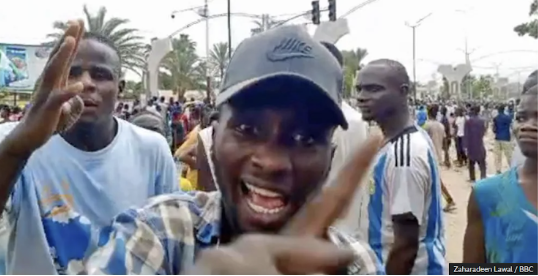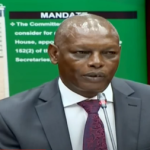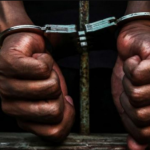A curfew has been imposed in Kano, Nigeria’s second-largest state, following protests against the high cost of living that escalated into widespread looting and property destruction, according to the governor’s office.
Kano witnessed the largest crowds on the first day of nationwide protests, which led to the shutdown of many businesses. Demonstrators in major cities chanted slogans like, “We are hungry.”
In Kano city, police used live bullets, tear gas, and hot water cannons to disperse thousands of demonstrators, resulting in four people being wounded and hospitalized. Protesters had set bonfires using tyres in front of Governor Abba Kabir Yusuf’s house. Looters also broke into a nearby warehouse, stealing 25-litre cartons of vegetable cooking oil and mattresses.
The curfew mandates that all residents stay at home, effectively halting further protests. The last census in Nigeria, conducted in 2006, estimated Kano state’s population at 9.4 million, with unofficial estimates now suggesting it is around 20 million.
The protests, planned to last for 10 days, were organized via social media and inspired by recent successful protests in Kenya that led to the government scrapping plans to increase taxes.
A spokesman for Mr. Yusuf stated that while the protests in Kano were initially peaceful, the governor had to declare a curfew to “restore order and ensure the safety of our communities” due to “rampant looting, destruction of property, and violence” by “thugs.”
In the capital, Abuja, a court ordered protesters to remain at the National Stadium, located on the city’s outskirts. However, on Thursday morning, demonstrators began moving toward the city center after gathering at the stadium’s gate, prompting police to fire tear gas to stop the procession, which disrupted traffic.
Security forces have been deployed at strategic locations in the capital, where banks have closed, as well as in surrounding towns.
In Lagos, Nigeria’s economic hub, protesters shouted “ole”, meaning “thief” in the Yoruba language – in reference to President Bola Tinubu and his government.
Many are angered by President Tinubu’s removal of a subsidy on fuel – announced with immediate effect during his inauguration speech in May 2023.
It was aimed at cutting government expenditure, but sent pump prices soaring with a ripple effect on other goods.
“Top on our demand is the subsidy removal. The government should reverse that decision,” Abuja protester Abiodun Sanusi told the BBC.
They also want the government to carry out wide-ranging reforms to the country’s electoral system and the judiciary.
Before this so-called “day of rage”, the government appealed to Nigerians not to take to the streets and give the president time for policies to bear fruit.
But Lagos protester Kingsley Uadiale dismissed this saying, “Hunger is the reason why we’re all here. You can’t beat a baby and ask the baby not to cry.”
If the Tinubu administration wanted patience then, he said, they should lead by example.
“You can’t tell us to be patient and you’re acquiring a private jet,” he said, citing plans to buy new planes worth millions of dollars for Mr Tinubu and his deputy Kashim Shettima.
Dabiraoluwa Adeyinka, an activist also protesting in Lagos, said the aim of the demonstration was to get the price hikes on essential commodities reversed.
“If they don’t yield, we will continue to protest,” she told the BBC



